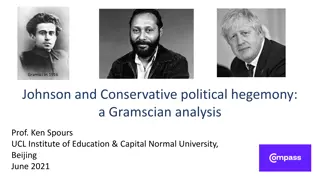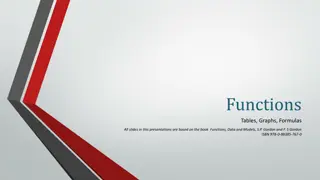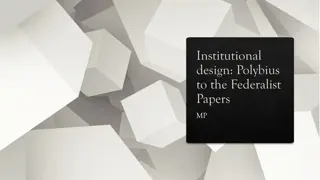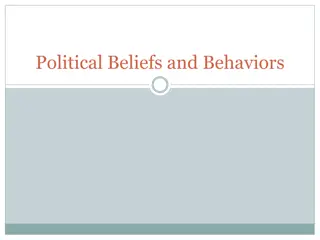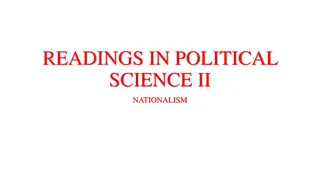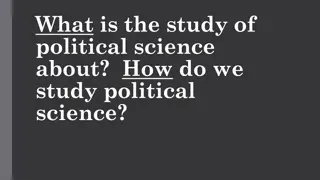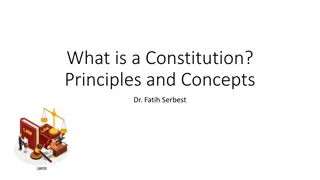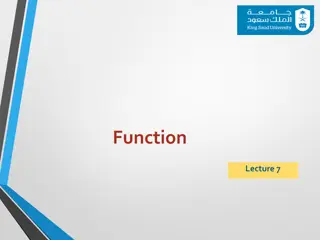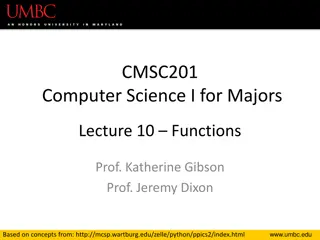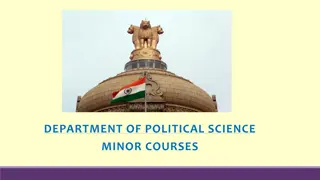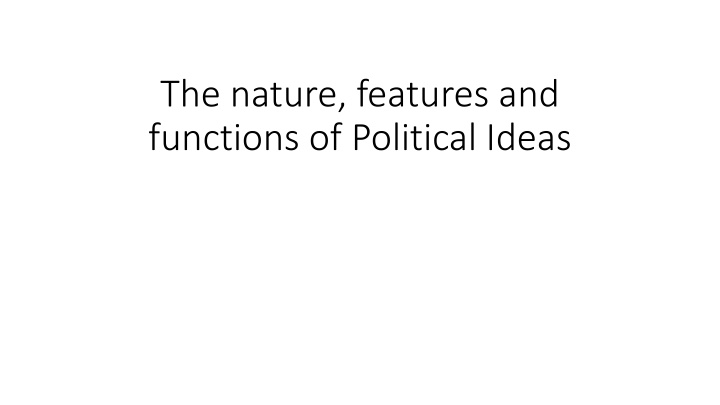
Political Ideas: Evolution and Interpretations
Explore the nature, features, and functions of political ideas, tracing their development from Karl Marx's perspective to modern interpretations by Marxist and liberal scholars. Discover the significance of political ideologies in shaping societies and influencing social control mechanisms.
Download Presentation

Please find below an Image/Link to download the presentation.
The content on the website is provided AS IS for your information and personal use only. It may not be sold, licensed, or shared on other websites without obtaining consent from the author. If you encounter any issues during the download, it is possible that the publisher has removed the file from their server.
You are allowed to download the files provided on this website for personal or commercial use, subject to the condition that they are used lawfully. All files are the property of their respective owners.
The content on the website is provided AS IS for your information and personal use only. It may not be sold, licensed, or shared on other websites without obtaining consent from the author.
E N D
Presentation Transcript
The nature, features and functions of Political Ideas
Introduction Karl Marx has argued that the philosophers have only interpreted the world in various ways: the point is to change it. This position shows that a lot of ideas, ideologies, philosophies have been generated over the years. Some of these ideas have been instrumental in changing the world and some will still be employed in changing the world. In relating to the world around us, all of us use some idea or theories one way or the other to do this. Sometimes we are not aware of this, but this is not to say that they are absent
Truth is that we all have political ideas, politics being one thing that affects our lives most. Yet some of these ideas have not been systematically developed. However, some have been properly developed in the intellectual works of scholars, political scientists and political philosophers over the years. Political ideas, political philosophy, political ideologies (used interchangeably in this course, even though there are some slight differences), aim at interpreting politics through a body of creed, tradition. Political Ideas refer to a body of intellectual framework or paradigm that radiate or create some form of reality of politics. Political ideas offer a worldview
The word political idea is substituted for the word political ideology because of certain pejorative implication of the term ideology As suggested by the French Philosopher, Destutt de Tracy, ideology (from idea and logos) is to be a study of ideas or a science of idea which is meant to uncover the origins of conscious thought and ideas. This is the real intention here. The aim of this course is directed at studying political ideas.
However, there has been a change in the use of the term, political ideology such that it acquired a derogatory meaning. Karl Marx, while employing the term made it appear as the idea of the ruling class and thus ideas that uphold the class system and enable the perpetration of exploitation. The Marxist will therefore have us interpret political ideology as those ideas which are false; it mystifies and confuses subordinate classes by hiding from them the contradictions informs societies; it makes the proletariat to not recognise that they are being expolited
Apart from the Marxist interpretation, some cold war liberals have argued that ideology means instrument of social control to ensure compliance and subordination. To them, ideology is a closed system of thought that claims a monopoly of truth and refuses to tolerate opposing ideas and rival beliefs
Another interpretation of ideology sees it as being abstract system of thought and thus an attitude of mind
However, pejorative conception of ideology fail in some ways and restrict the true meaning of the term political ideology. And this ensures that some ideas are excluded from the class of political ideas. A proper definition of political ideology should be all encompassing; thus political ideology may be defined as action-oriented belief system, an interrelated set of ideas and ideals that in some ways guide or inspire political actions Seen this way, the adoption of the term political ideas captures this defition.
Political ideas, as a course, undertakes the study of ideas which have impact on politics by suggesting how politics should be conceived and how the state should be operated. Political concepts and ideas like freedom, fairness, equality, justice, rights, liberalism, communism, fascism, which are regularly employed by people but not fully understood will be examined and their historical development and current usage will be made explicit
USEFULNESS OF POLITICAL IDEAS Some are of the view that political ideas have no impart on political decisions and governance This is however is not true. Political ideas have, over the years, been instrumental in influencing political decisions. The works on capitalism, traceable to Adams Smith and David Ricardo, have shaped political systems. Communism, practised by the USSR, with strains still surviving around the world, is greatly influenced by the political ideas of karl marx and Lenin
Political ideas are not passive. They have the capacity to inspire and guide political actions and to shape material life in a polity. Political ideas are manifestations of lived-realities and developed in response to certain issues in a political system which need to be shaped in order to bring about desired responses. They are expected to achieve certain political ambitions. this makes political ideas and political practices to be inseparable
Political ideas structure political understanding. This is so because it provides a lens through which the world is understood and explained. When imbibed, political ideologies is a set of values that guide behaviours and conduct.
Political ideas set political goals and inspire activism. It is through aligning with popular ideas of the society or polity they belong to that they set goals of what to be done
Political ideas shape the nature of political systems and thereby regulate others spheres found within: economic, religious, social, etc. Every political system is informed by some set of values. This in some ways determine the manner in which political leaders will behave and what citizens should expect from them. Political ideology sets expectation regarding what to expect from other people too
Political ideas act as a from of social cement. This achieved through the provision of unifying beliefs and values to social groups. For instance, in historical development, particular social groups have shared certain political beliefs: liberalism- the middle class; conservatism- landed aristocracy; socialism- working class. By sharing the same political idea or ideology a group is able to foster a sense of belonging and build solidarity.




